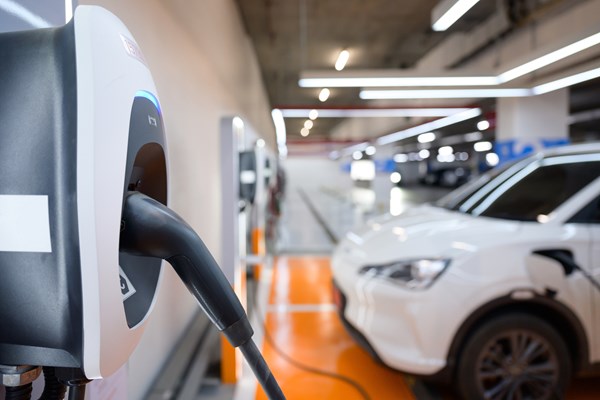Electric vehicle bills charge ahead
Mar 29, 2023

Second Decking (April 6) is just one week away at the Hawaii State Legislature. That's the deadline for bills that have been amended by their non-originating chamber to emerge from all their committees.
Ulupono Initiative is supporting many bills this 2023 session relating to transportation electrification, including electric vehicles (EV). The following are three examples of priority bills that together support reducing our dependence on fossils fuels and lowering greenhouse emissions:
- HB346 HD2 SD1 SD, Relating to Electric Vehicle Charging Infrastructure. This bill requires that the design of new state facilities be electric vehicle charger-ready; requires the Hawaii State Energy Office, in consultation with the Department of Accounting and General Services and Department of Transportation, to survey and identify high-priority state facilities for which the office will consider cost assessments for retrofitting; establishes a goal to retrofit state facilities to be electric vehicle charger-ready; and appropriates funds.
Requiring qualifying facilities to be “EV-ready” is smart future-proofing. In 2021, the International Code Council updated its building standards to include EV-ready provisos. One main rationale was that the cost of retrofits is significantly more expensive than when installed upfront, and such an upfront investment is a relatively small part of the total building cost. A recent case study in San Francisco estimated the costs of EV-readiness at the time of construction to be less than $1,000 per parking spot. Ulupono’s own research shows that a typical structured parking space can cost $42,000–$57,000 per space to build. A relatively low incremental amount seems worth the option to expand EV access. Additionally, the City and County of Honolulu passed Ordinance 20-17 requiring EV-readiness for certain new construction. Passing this State of Hawaii policy will ensure a consistent policy is applied statewide, and that the state is leading by example with the least cost to taxpayers. A comprehensive effort to develop a retrofit plan is also very prudent.
- HB1415 HD1 SD1, Relating to Energy. This bill requires the Hawaii Public Utilities Commission to administer an electric vehicle charging system (EVCS) loan program to provide loans to applicants who install eligible electric vehicle charging systems, and it appropriates funds.
Ulupono supports clean, alternative fuel transportation, as ground transportation makes up a significant portion of Hawai‘i’s reliance on imported oil and is the largest contributor to our state’s greenhouse gas emissions. To streamline meeting State climate change goals and sustainability efforts, the EVCS loan program can provide the necessary infrastructure capital to support EV adoption. While significant impact has been made from the current EVCS Rebate Program, continued support is still needed. A recent survey by Cox Automotive indicates that a lack of EV charging remains the top barrier to EV adoption, with 57% of consumers noting the issue (per Cox Automotive Path to EV Adoption survey conducted in July 2021). Building off the momentum of the 2021 and 2022 State Legislatures, this program, with dedicated resources, can look to expand its overall impact in our community. We are also supportive of the new emphasis to serve low- and moderate-income communities, which helps to ensure that all community members stand to benefit from access to EVs.
- SB809 SD2 HD1, Relating to Transportation. This bill repeals the electric bicycle and electric moped rebate program and electric bicycle and electric moped subaccount of the highway development special fund, and establishes the “electric mobility” rebate program and “electric mobility” special fund while appropriating moneys.
As conveyed in testimony, Ulupono strongly supports the expansion of the program to include more electric mobility devices, the addition of more funding for the program, and increased support available for those for whom access to affordable and reliable transportation can be life-changing. In 2022, the City of Denver’s e-bike subsidy program touted the following outcomes, including delivering actual mode shift and reduced emissions, improving access to opportunities and destinations for those who need it, and illustrating how the subsidy made a difference in their consumer decisions. Electric mobility devices can transform our community’s transportation habits easily and help provide real transportation choices.
To learn more about where these important measures stand, visit capitol.hawaii.gov.

